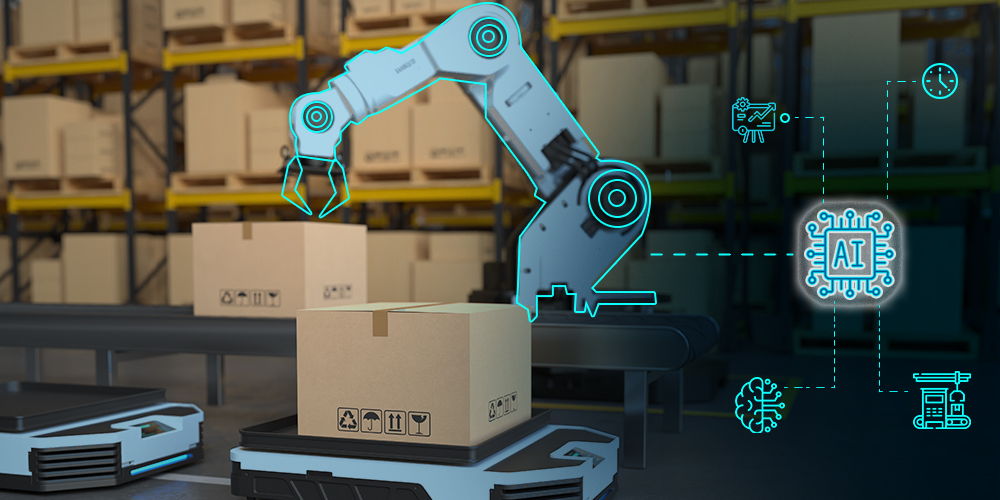Businesses these days constantly look for ways to make their operations faster and more efficient. To do so, businesses need to smoothen up their inventory management. In other words, inventory management can ensure that the right products are available in the correct quantity and at the right time, making it a key driver of success. Integrating Artificial Intelligence and Machine Learning into inventory management systems can revolutionize the inventory process from being static to proactive. Incorporating ML and AI into inventory management can provide valuable strategic benefits. In this article, let us explore how businesses can indulge the benefits of integrating AL and ML in inventory management software and boost efficiency and productivity.
Demand Forecasting Accuracy:
AI and ML algorithms have transformed inventory demand forecasting by analyzing historical data, market trends, and external factors. Traditional techniques frequently struggled to effectively estimate demand, resulting in either overstocking or stockouts. AI-powered forecasting models, on the other hand, can process massive volumes of data in real time, find patterns, and alter projections accordingly. This improves accuracy in forecasting new demands and trends decreases extra inventory, lowers carrying costs, and ensures that supplies are available when and where they are needed. Businesses can leverage this technology to manage their inventory and make strategies that fit best for the changing market landscape.
Increased Productivity:
When your inventory management process becomes seamless, your overall productivity increases as well. In other words, AI in inventory management software can foster better productivity as AI continuously gains knowledge to function independently through machine learning. This makes completing complex jobs easier and faster. AI algorithms can efficiently monitor and increase processes including, item quantities, lead time, errors, cycle times, downtime rate, etc. Additionally, AI can automate various mundane and routine tasks, freeing up a lot of time for your employees.
Improved Warehouse Management:
By utilizing AI and ML algorithms, managing warehouses becomes smoother, faster, and error-free. Businesses with big inventories that need better warehouse management, should employ a good ERP inventory management solution. Better warehouse management can offer a clear view of your supply chain management issues while streamlining the inventory process. AI in inventory management offers many benefits in warehouse management, such as –
- AI system to provide better and real-time communication within different warehouses.
- Optimizes logistics functions to reduce process time and manual errors.
- AI can save resources and money on inventory management.
- Automates the entire warehousing process to give better insights into item stocks and eliminate any stock crises.
Real-time Data Analysis
The processing speed of AI and ML systems is unmatched in its ability to process large sets of data. This enables organizations to instantly monitor their inventory levels, sales, and other important metrics through real-time data analysis. ML algorithms and AI-powered tracking systems offer real-time inventory visibility across the entire supply chain management. Logistics companies can track shipments, keep an eye on stock levels, and identify potential bottlenecks or delays, ensuring efficient inventory management and timely delivery. This quick analysis allows for prompt decision-making, helping businesses respond quickly to changes in demand, supply chain disruptions, or market fluctuations. Real-time insights enable organizations to adjust their inventory strategies as needed, reducing risks and optimizing operational efficiency.
Predictive Maintenance:
AI and ML algorithms can go beyond traditional inventory management tasks by predicting equipment failures and maintenance needs. In the context of inventory management, this means anticipating issues with storage facilities, transportation, or other logistical components. By identifying potential risks, organizations can proactively address them, reducing downtime and avoiding costly disruptions in supply chain management. This predictive capability enhances overall reliability and resilience in inventory management systems. By leveraging AI algorithms, it is possible to identify quality issues and deviations from expected standards. Automating quality control processes can help businesses minimize human error, improve overall accuracy, and reduce the likelihood of defective products reaching customers.
Dynamic Pricing Plans:
Algorithms that are powered by artificial intelligence possess the capability to assess market dynamics, evaluate competitor pricing, gauge customer demands, and monitor customer behaviour. This enables businesses to create flexible pricing plans that can be adjusted in real time based on changes in demand and supply during inventory management. This means that during periods of high demand, pricing can be optimized to increase profits, while during periods of low demand, pricing can be lowered. This level of flexibility helps to maintain competition and maximize revenue.
To Sum Up:
The future market dynamics are being dominated by artificial intelligence and machine learning. To stay ahead of the competition, it’s important to engulf your inventory management with robust and effective inventory management software. Although, there are many inventory management systems out there, finding the right one that suits your industry needs can give you a big edge. WrkPlan ERP inventory management is fully integrated with AI and ML algorithms that can seamlessly boost efficiency in warehouse management while streamlining your inventory. To learn more about WrkPlan or how to streamline your inventory management, dial 1-800-120-2449 to speak to our expert consultant, or sign up today to book a free live demo.

